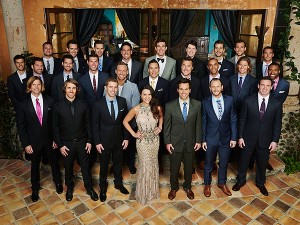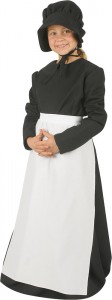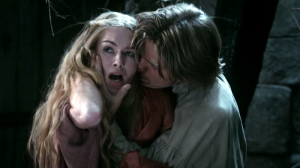I’d be remiss if I didn’t spend at least a little time on the Moxie blog discussing what is quite possibly my favorite topic in the world: The Bachelorette and The Bachelor. Since this is the last opportunity I’ll have to contribute to this space–brace yourself.
My roommates grew accustomed to my Monday night routine over the last eight weeks: my door is shut by 8pm sharp, and, for two hours, it was just me, Andi Dorfman (this season’s Bachelorette), and her 25 suitors. For those of you who somehow haven’t heard me talk obsessively about the show at one point or another (aka those of you who have never met me), the show works in this way: the Bachelorette goes on a series of one-on-one or group dates each week until she eliminates all of them except for one, to whom (the producers of the show pray) she will get engaged. Andi’s season worked out accordingly: she is currently engaged to Josh Murray, a financial advisor the show preferred to label as a “former pro baseball player.”
See, the Bachelorette is all about reducing things down to labels–isn’t that what the show is built around, reducing the idea of “love” to a collective 20 hours spent with a person leading up to a proposal in an exotic locale, all filmed on camera? It’s easier that way, isn’t it; easier for viewers to buy into this idea of “love” when it’s shoved down our throat as such, and also easier to buy into our “heroes,” the Bachelors and Bachelorettes, when they’re characterized in a similar fashion as Josh was: by their career (or even a former career), family, or past appearances on another Bachelor/ette franchise, since every lead “hero” is a contestant from a past season. Emily Maynard, the Bachelorette two seasons ago, for example, was the sweet Southern blonde whose former fiancé tragically passed in a plane crash while she was pregnant with her daughter. Desiree Hartsock, last season’s Bachelorette, was the wholesome, fan-favorite wedding dress designer who was tragically dumped by previous Bachelor Sean Lowe after he met her family.
Let me make this clear right now: I will ALWAYS watch this show. It’s reality TV at it’s best and I’m addicted. However, I couldn’t necessarily identify with Emily and Desiree. Sure, I liked watching their “journeys,” the “drama” that ensued, and yes, their proposals–but I do think that, if I were the Bachelorette (one of my backup plans in life, shhhh), I would’ve played the role differently than Emily and Desiree. There was something missing–some kind of fire, drive, and passion that these two didn’t seem to possess. Or maybe they did; there were certainly glimpses (Emily calling out a contestant for calling her daughter “baggage” was a plus), but the editing of their seasons seemed to conceal most of their personalities, extraneous from the label ABC placed on them from the start. Don’t get me wrong–I still rooted for them, but reality TV often makes characters (or caricatures) of its contestants.
But Andi was different–or, maybe just her label was. She was my favorite Bachelor contestant ever, even before she called out her season’s Bachelor, Juan Pablo, on the terrible, sexist, homophobic person he is (that even his “label” on the show as loving, romantic, soccer-playing Venezuelan single parent couldn’t conceal in the end). Andi telling Juan Pablo that his narcism, selfishness, and pompousness was unacceptable to her was something I could identify with from my own past, and she communicated her feelings to him in a manner in which I hope to conduct myself in the future. From her boldness to her career (I want to be a lawyer, she’s an assistant district attorney); from her religion (both Andi and I are Jewish) to even the letters that compose her name (A-N-D-I and D-A-N-I–far-fetched, but bear with me)…Andi has been the closest thing I could find to myself on TV.
Yet aren’t I Emily and Desiree too? Despite me not necessarily identifying with their exact lifestyles, I look just like Emily and Desiree–we compose the majority of the Bachelor/ette’s contestants, and (as a result) its audience. The Bachelor/ette has consisted of approximately 90% Caucasian contestants and 100% Caucasian leads. The demographic that watches the Bachelor/ette with the same vigor that I do will definitely watch the show because it’s wonderful reality TV, but deep down inside I also know it’s because every season, although we may not be as long-lost-sister-esque as Andi and me, there will be some version of us on TV at 8pm on Mondays.
There’s nothing wrong with liking seeing a version of yourself on TV–but there’s something wrong when that’s all there is.
From the beginning, Moxie’s goal was to discuss those aren’t discussed enough, aka those who aren’t represented on the Bachelor/ette. The show is immune to change. As host Chris Harrison has said: “Look, if you’ve been making pizzas for 12 years and you’ve made millions of dollars and everybody loves your pizzas and someone comes and says, ‘Hey, you should make hamburgers.’ Why? I have a great business model, and I don’t know if hamburgers are going to sell.” And later: “Is [the show’s] job to break barriers, or is it a business? That’s not for me to answer.”
I do think Andi began chipping at the “barriers” Chris Harrison mentioned in that interview. She was intelligent, headstrong, and unapologetic –and of course, she was called a “brat,” “weird,” “defensive,” “fake,” “hypocritical,” “aggressive,” and “not strong.” Sound familiar, feminist movement? Andi, in my opinion, set the bar for the way in which a Bachelorette will be “labeled” by ABC from now on.
But that’s only the first step.
I’ve struggled with the idea of privilege during Moxie, but that–the ability to watch myself travel the world, fall in “love”, and get my heart broken every Monday–is privilege. Pizza’s delicious, Chris, but hopefully the menu will change soon.




 The season finale for my favorite show in the entire world,
The season finale for my favorite show in the entire world, 
